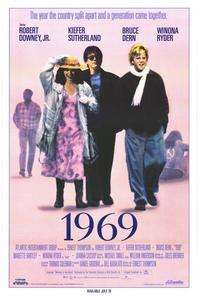1969 (film)
| 1969 | |
|---|---|
 Theatrical release poster | |
| Directed by | Ernest Thompson |
| Produced by |
Bill Badalato Daniel Grodnik |
| Written by | Ernest Thompson |
| Starring | |
| Music by | Michael Small |
| Cinematography | Jules Brenner |
| Edited by | William M. Anderson |
| Distributed by | Atlantic Releasing |
Release dates |
|
Running time | 95 minutes |
| Country | United States |
| Language | English |
| Budget | $37 million |
| Box office | $5,979,011[1] |
1969 is a 1988 drama film starring Robert Downey, Jr., Kiefer Sutherland, and Winona Ryder. It was written and directed by Ernest Thompson. The original music score is composed by Michael Small. The film deals with the Vietnam War and the resulting social tensions between those who support and oppose the war in small-town America.
Plot
The boys (Robert Downey, Jr. and Kiefer Sutherland) hitchhike home from college, arriving on Easter morning and shout their greetings across the glen to their family during a lakeside Easter Sunrise service, much to the amusement of Ralph's younger sister Beth (Winona Ryder) and mother Ev (Joanna Cassidy) and embarrassment of Scott's mother Jessie (Mariette Hartley) and father Cliff (Bruce Dern). Later that day, they drive Scott's older brother Alden, who's shipping off to Vietnam, to the bus depot; Alden admits to Scott that he is afraid.
A few weeks later, Scott and Ralph again return home from college to attend Beth's high school graduation, where the learn that Alden has disappeared, and is considered Missing in Action, and Scott learns that Ralph has flunked out of college (thus making him eligible to be drafted). Ralph and Scott hatch a plan to steal their files from the local draft board office, but they are caught, and Ralph is arrested.
Scott is now determined to avoid Ralph's fate and plans to leave town and head to Canada to avoid the draft. Beth finds Scott in his van and convinces him to allow her to join him on his trip. They admit their attraction to one-another. Later, the two decide to visit Ralph in jail to tell him that they are leaving.
Scott and Beth get to the Canada–US border and are about to cross but have a change of heart and head back to Maryland. When they get home, they learn of Alden's death. Scott leads a huge march downtown in the midst of Alden's funeral, and where Ralph is released from jail and they are reunited.
Main cast
- Robert Downey, Jr. as Ralph Karr
- Kiefer Sutherland as Scott Denny
- Bruce Dern as Cliff Denny
- Mariette Hartley as Jessie Denny
- Winona Ryder as Beth Karr
- Joanna Cassidy as Ev Karr
Critical reception
Critics shared some mixed feelings about the movie. Overall, the film has a 55% "Rotten" rating on Rotten Tomatoes based on 11 critic reviews. ""1969," the directorial debut of Ernest Thompson, is an aimless drama, its purpose and promise lost in a thicket of false endings and a fog of nostalgia," wrote Rita Kempley of The Washington Post.[2] Janet Maslin of The New York Times, wrote that "Mr. [ Bruce ] Dern, unusually laconic here, is unexpectedly moving as the character who seems most confused by changing times.[3] And Variety said of it, "Affecting memories and good intentions don't always add up to good screen stories, and such is the case in 1969, one of the murkiest reflections on the Vietnam War era yet, notwithstanding good performances all around and bright packaging of Kiefer Sutherland and Robert Downey, Jr. in the leads."[4]
Box office
The film was a box office bomb, grossing $5,979,011 against a $37 millon budget.
Soundtrack
The film's soundtrack consists of original period rock. However, it also includes a notable re-recording of The Youngbloods' classic hit "Get Together", performed as a solo by Youngbloods lead singer, Jesse Colin Young.
References
- ↑ "1969 (1988)". Box Office Mojo. Retrieved 8 August 2011.
- ↑ "'1969' (R)". Washingtonpost.com. 1988-11-18. Retrieved 2012-07-23.
- ↑ Maslin, Janet (1988-11-18). "Review/Film; 2 Families Seek Peace With Honor, in '1969'". The New York Times.
- ↑ "Variety Reviews - 1969 - Film Reviews - - Review by Variety Staff". Variety.com. 1987-12-31. Retrieved 2012-07-23.
External links
- 1969 at the Internet Movie Database
- 1969 at AllMovie
- 1969 at Rotten Tomatoes
- Sample frames from the cinematographer of 1969